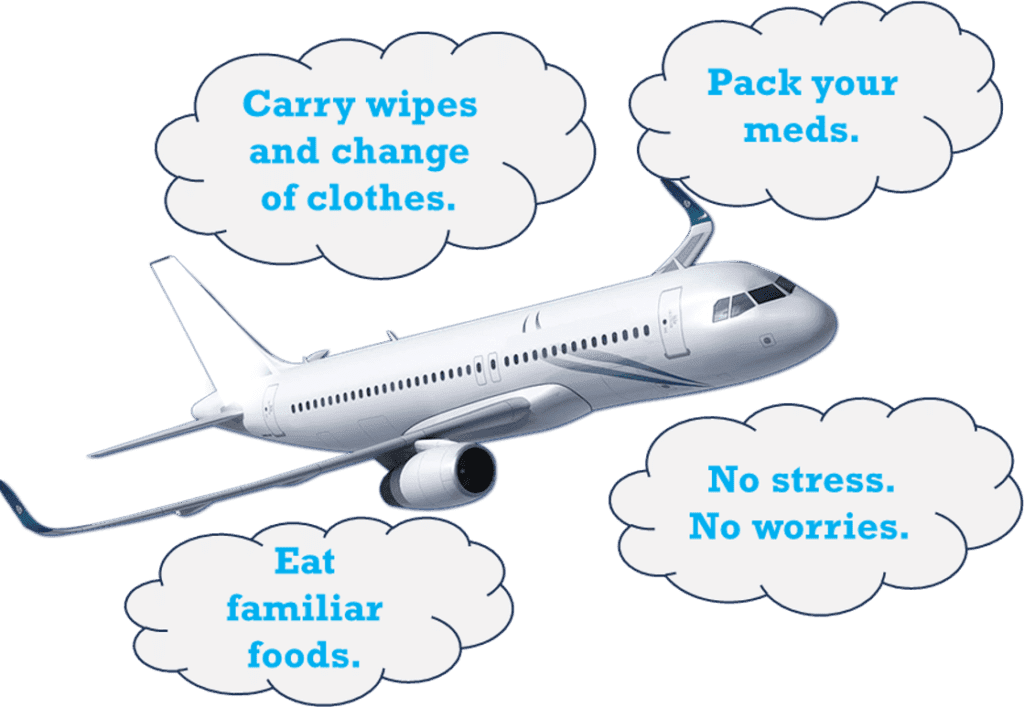
Traveling with IBS (irritable bowel syndrome) can present challenges, but with careful planning and adaptive strategies, you can make your journey more enjoyable and comfortable. Here are some practical tips and recommendations to help manage your IBS symptoms while on the go.
- Your IBS survival kit: Create a “survival kit” that suits your preferences, such as a computer bag, briefcase, large purse, or backpack. Include a change of clothes and a small supply of tissue in case it’s unavailable when you need it. This kit will provide you with peace of mind during your journey.
- Mindful food choices: People with IBS often experience adverse reactions to unfamiliar foods. It is advisable to adopt a cautious approach to your diet while traveling. Instead of indulging in unknown dishes, opt for foods that are familiar and known to be gentle on your gut. Researching restaurants and menus in advance can help you identify IBS-friendly options. Packing safe snacks, such as non-irritating crackers, is also a wise idea. Be cautious of foods and beverages that may trigger your symptoms. Avoid large meals, high-fat foods, fried dishes, coffee, caffeine, and alcohol, as they can worsen abdominal cramps and diarrhea. Stick to foods you know are comfortable for your digestive system, especially when dining out. Check out our article on IBS symptoms and causes here.
- Medication management: Divide your medications into two containers, keeping one in your hotel room and carrying the other with you at all times. This ensures you’re prepared, regardless of your location. Consider bringing an international cell phone or purchasing an international calling card for easy communication with your physician if needed.
- Flying with comfort: If traveling by plane, request a seat close to the restroom to ensure easy access. Opting for an aisle seat will also make it convenient for you to move around without disturbing fellow passengers. Prioritize your comfort and convenience during the flight.
- Consider the freedom of driving: If possible, consider driving to your destination. Many individuals find it more comfortable to travel by car, as it allows them to stop when needed for restroom breaks or breaks in general. The control and flexibility offered by driving can alleviate travel-related stress.
- Strategic route planning: Before setting off on a long drive, research the distance between rest areas or highway exits with accessible restrooms. Plan your walking and driving routes in advance to ensure a direct and efficient journey. Avoid modes of transportation that lack accessible restroom facilities.
- Addressing constipation: Long-distance travel can sometimes contribute to constipation, either due to limited bathroom access or a hectic schedule. To counter this, consider using stool softeners or similar remedies before your trip to prevent constipation and maintain regular bowel movements.
- Managing diarrhea-related anxiety: Many individuals with IBS feel anxious about access to bathrooms while traveling, particularly on flights. If you experience anxiety, there are several approaches to alleviate it. Consider taking prescribed anxiolytic medication, or explore alternative methods such as meditation apps or calming playlists. Additionally, choosing an aisle seat can help minimize stress associated with requesting frequent restroom breaks.
- Probiotics for prevention: Travelers, especially those with IBS, face the risk of food poisoning, which can trigger IBS flare-ups and lead to traveler’s diarrhea. Taking a probiotic supplement a few days prior to and during your trip can help reduce the chances of developing diarrhea and alleviate IBS symptoms. Even if you don’t typically use probiotics, considering their temporary use while traveling is advisable.
- Accommodations matter: When selecting accommodations, avoid places where multiple rooms share a single restroom. If you anticipate arriving before check-in time or require a later check-out, don’t hesitate to request accommodations that meet your needs. Most hotels are accommodating and understanding.
- Sustaining healthy habits: Stress and disruptions to routine can exacerbate IBS symptoms. To mitigate this, try to maintain your regular exercise regimen while on the road. If your accommodation has a fitness facility, take advantage of it. Exercise can help prevent flare-ups. Similarly, prioritize adequate sleep to minimize stress levels. Strive to maintain a sleep schedule similar to your routine at home.
- Overcoming language barriers: Having IBS often involves the need to inquire about restroom locations or ask questions about specific ingredients in dishes. If you’re traveling to a destination where you’re unfamiliar with the local language, it can be helpful to learn a few key phrases beforehand. Learn how to ask for the restroom in the local language and keep change for pay toilets. Knowing how to ask for the bathroom or inquire about food ingredients can alleviate some of the stress associated with traveling with IBS.
- Carry all required documentation: Familiarize yourself with any necessary documentation required to refill prescriptions at your destination. Keep your physician’s contact information handy in case of emergencies.
- Punctuality and preparedness: Ensure you have enough time in the morning to reach the airport without feeling rushed or anxious. It’s always wise to pack an extra bag containing a change of clothes in case your luggage goes astray. Be ready for the unexpected to stay prepared and stress-free.
- Flexibility and communication: Remember that IBS can present unexpected challenges. Discuss your travel plans with your family or travel companions, and be open to making last-minute adjustments if necessary. Maintain flexibility and remain optimistic, knowing that tomorrow may bring a better experience.
Your IBS Travel Checklist:
- Pack safe and familiar snacks.
- Carry all required documentation.
- Consider choosing an aisle seat when flying.
- Utilize stress-reducing techniques like meditation apps.
- Take a probiotic supplement before and during travel.
- Maintain your exercise and sleep routines.
- Learn key phrases related to bathrooms and food in the local language.
- Research destination beforehand – food choices, bathroom options, navigating around the city
With careful planning and a flexible mindset, you can successfully manage your travel experience while living with IBS. Embrace the tips provided in this article to make your journey more comfortable, enjoyable, and stress-free. Your personal management plan will help you navigate the obstacles and make the most of your vacation time. We hope you find these tips helpful for your next trip! Safe travels!
References:
- Lovell, R. M., & Ford, A. C. (2012). “Global prevalence of and risk factors for irritable bowel syndrome: a meta-analysis.” Clinical Gastroenterology and Hepatology.
- Lackner, J. M. (2019). “Irritable bowel syndrome (IBS) and travel: a review of literature on prevalence, travel-related triggers, and prevention strategies.” Journal of Travel Medicine.
- Hauser, G., Rieder, J., & Mckee, D. (2012). “Travel-related risk factors for irritable bowel syndrome and its painful symptoms: a systematic review.” Journal of Travel Medicine.










